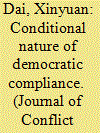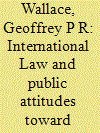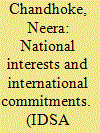| Srl | Item |
| 1 |
ID:
073762


|
|
|
|
|
| Publication |
2006.
|
| Summary/Abstract |
Do democratic institutions enhance a country's compliance with international commitments? The author develops a game-theoretic model that highlights the conditional nature of democratic institutions' effect on compliance. Rather than assuming that the electorate in a democracy benefits from compliance uniformly, the author considers domestic distributional consequences of compliance. The model thus incorporates the preferences of competing domestic constituents as well as their politically relevant attributes such as electoral leverage and informational advantage. The model shows that, although electoral institutions intensify politicians' accountability to domestic constituents, the direction of this electoral effect on compliance is determined by the political attributes of competing interests. The author illustrates this theory with examples of international economic and environmental policies.
|
|
|
|
|
|
|
|
|
|
|
|
|
|
|
|
| 2 |
ID:
117994


|
|
|
|
|
| Publication |
2013.
|
| Summary/Abstract |
Domestic approaches to compliance with international commitments often presume that international law has a distinct effect on the beliefs and preferences of national publics. Studies attempting to estimate the consequences of international law unfortunately face a wide range of empirical and methodological challenges. This article uses an experimental design embedded in two U.S. national surveys to offer direct systematic evidence of international law's effect on mass attitudes. To provide a relatively tough test for international law, the surveys examine public attitudes toward the use of torture, an issue in which national security concerns are often considered paramount. Contrary to the common contention of international law's inefficacy, I find that legal commitments have a discernible impact on public support for the use of torture. The effect of international law is also strongest in those contexts where pressures to resort to torture are at their highest. However, the effects of different dimensions in the level of international agreements' legalization are far from uniform. In contrast to the attention often devoted to binding rules, I find that the level of obligation seems to make little difference on public attitudes toward torture. Rather, the relative precision of the rules, along with the degree to which enforcement is delegated to third parties, plays a much greater role in shaping public preferences. Across both international law and legalization, an individual's political ideology also exerts a strong mediating effect, though in varying directions depending on the design of the agreement. The findings have implications for understanding the overall impact of international law on domestic actors, the importance of institutional design, and the role of political ideology on compliance with international agreements.
|
|
|
|
|
|
|
|
|
|
|
|
|
|
|
|
| 3 |
ID:
184899


|
|
|
| 4 |
ID:
105363


|
|
|
|
|
| Publication |
2011.
|
| Summary/Abstract |
There is no integrated regime governing efforts to limit the extent of climate change. Instead, there is a regime complex: a loosely-coupled set of specific regimes. We describe the regime complex for climate change and seek to explain it, using interest-based, functional, and organizational arguments. This institutional form is likely to persist; efforts to build a comprehensive regime are unlikely to succeed, but experiments abound with narrower institutions focused on particular aspects of the climate change problem. Building on this analysis, we argue that a climate change regime complex, if it meets specified criteria, has advantages over any politically feasible comprehensive regime. Adaptability and flexibility are particularly important in a setting-such as climate change policy-in which the most demanding international commitments are interdependent yet governments vary widely in their interest and ability to implement them. Yet in view of the serious political constraints, both domestic and international, there is little reason for optimism that the climate regime complex that is emerging will lead to reductions in emissions rapid enough to meet widely discussed goals, such as stopping global warming at two degrees above pre-industrial levels.
|
|
|
|
|
|
|
|
|
|
|
|
|
|
|
|